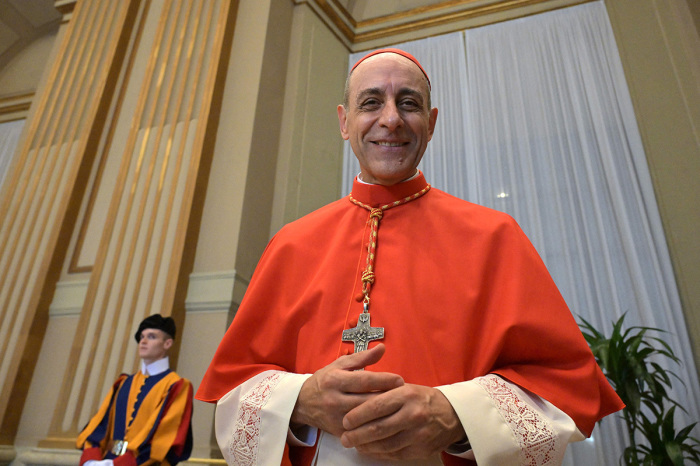Queen's former chaplain says Cardinal Fernandez's sex writings smack of occultism

Queen Elizabeth II's former chaplain says the recently resurfaced writings of Cardinal Víctor Manuel Fernández about sexuality exhibit a skewed theology that echoes occult sex magic.
Gavin Ashenden, who served as the queen's chaplain from 2008 to 2017, said in a video posted last week that Fernández's unearthed out-of-print books Mystical Passion: Spirituality and Sensuality and Heal Me with Your Mouth: The Art of Kissing have "caused a certain amount of scandal, not only because it's odd for a priest to write in graphic detail on such matters, but because it shows a preoccupation with sexuality that we wouldn't really expect from a man with an authentic vocation to the Catholic priesthood."

Ashenden penned an op-ed for The Catholic Herald that reiterated the views he expressed in his video.
Of the two books Fernández originally published in the 1990s, MysticalPassion: Spirituality and Sensuality especially raised eyebrows for its content, which included explicit reflections on "spirituality and sensuality," the difference between male and female orgasms, divine love as "mystical orgasm" and a supposed mystical erotic encounter with Jesus Christ that was reportedly recounted to Fernández by a 16-year-old girl.
Fernández said during a recent interview with Crux that he "certainly would not write" the book today, and noted how he had it pulled from publication.
Ashenden, who became a Roman Catholic after leaving the Church of England in 2017, suggested that even if they are decades old and out of print, Fernández's books are critical to understand since he serves as prefect of the Vatican's doctrinal office behind its recent Amoris Laetitia and Fiducia Supplicans.
The two declarations led to confusion regarding the Vatican's views on divorced people and same-sex couples, respectively.
"But does it tell us anything about his theological presuppositions as the author of those two very important, recent documents?" Ashenden asked. "I think it does. And what it tells us is alarming and disturbing."
Ashenden claimed that Fernández showed that he is steeped in the Freudian concept that mystical experiences and spiritual ecstasy are inextricable with sexuality, which he said is "a lamentable miscalculation."
"If you inhabit a world dominated by sexual dynamics as the main driver of human consciousness and unconscious appetite, it's inevitable," he said. "You'd misconstrue any ecstasy as being sexual, but Christians know this isn't true. The bliss that comes as an occasional gift of the Holy Spirit is experienced as a form of ecstasy, but only in a very shallow and restricted world is ecstasy exclusively sexual."
Ashenden alleged a darker element to Fernández's views on sex and spirituality, which he claimed share much in common with occult beliefs on such topics.
"One of the most alarming aspects of the way in which Cardinal Fernández has written is that he shares the same presuppositions about sex as esotericists and those who practice a different kind of magic: the occultists," he said.
"Sex, for them, is a means of instrumentation of the divine, as it is for Fernández," he continued. "The Christian response to the esoteric tradition and the occultists is that they are wrong about God. Sex in esotericism is supposed to facilitate a direct experience of the Godhead, but only if you have a different definition of who God is."
Ashenden traced present-day occult views of sexuality to Renaissance figures such as Marsilio Ficino and Giordano Bruno, who he said: "posited that the erotic principles of attraction, the occult powers of magic, and the dynamic structure of the universe are all part of a single continuum."
Their beliefs, he claimed, have led to the concept "that sexual energy is a potent force that can be harnessed to transcend a common and unenlighted perception of reality that most other people suffer from." He noted such an idea ultimately emerges from Gnosticism, one of the first major heresies the Christian Church confronted.
The most notorious practitioner of such ideas, said Ashenden, was Aleister Crowley, an influential early-20th-century occultist. Branded "the wickedest man in the world," he became a prominent cultural figure in the United Kingdom, and his portrait was featured on the cover of The Beatles' "Sgt. Pepper's Lonely Hearts Club Band."
"Cardinal Fernández — admittedly writing as a younger man; he was a 36-year-old priest — makes the fatal and, one has to say, heretical error of attributing to sexual climax an automatic instrumentation of divinization," Ashenden wrote.
"He shares the alchemical and esoteric view of the uninterrupted continuum that allows humanity to access divinity through the gateway of some form of mysticism," he added. "The experience and teaching of the Church is that this is neither true, nor Christian."
Ashenden closed both his video and article by urging Fernández to resign.




























